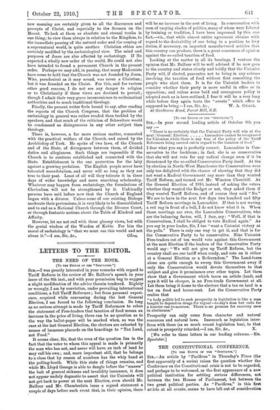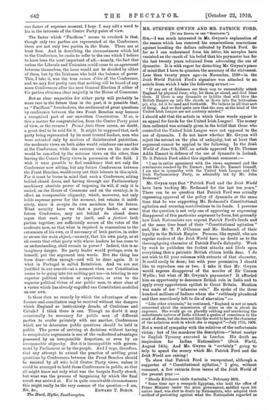THE CONSTITUTIONAL CONFERENCE.
[TO THE EDIT= OF THE "SPECTATOR."] Sru,—An article by "Pacificus " in Thursday's Times (the first apparently of a series) raises the question whether the Conference on the Constitutional crisis is not to be regarded, and perhaps to be welcomed, as the first appearance of a new political institution for settling serious differences, not between the two Houses of Parliament, but between the two great political parties. As " Pacificns," in this first article at all events. seems to have left out of consideration
one factor of supreme moment, I hope I may add a word to his in the interests of the Centre Party point of view.
The factor which " Pacificns " seems to overlook is that, though only two parties are represented at the Conference, there are not only two parties in the State. There are at least four. And in describing the circumstances which led to the Conference, he omits to refer to the one which I believe to have been the most important of all,—namely, the fact that unless the Liberals and Unionists could come to an agreement between themselves, the issue would not be decided by either of them, but by the Irishmen who held the balance of power. This, I take it, was the true raison d'etre of the Conference, and we may feel pretty sure that nothing will be heard of any more Conferences after the next General Election if either of the parties obtains a clear majority in the House of Commons.
But as clear• majorities for either party will probably be more rare in the future than in the past, it is possible that, as " Pacificus" foreshadows, the settlement of great questions by conference between the two Front Benches may become a recognised part of our unwritten Constitution. If so, is this a matter for congratulation, from the Centre Party point of view, or the reverse P Primd fade there seems, no doubt, a great deal to be said for it. It might be supposed that, each party being represented by its most trusted leaders, men who were actuated only by motives of disinterested patriotism, the moderate views on both sides would reinforce one another at the Conference, while the extreme views on the one side would be cancelled by the extreme views on the other, thus leaving the Centre Party views in possession of the field. I wish it were possible to feel confidence that not only the Conference now sitting, but any future Conferences between the Front Benches, would carry out their labours in this spirit. For it must be borne in mind that such a Conference, sitting behind closed doors, and having through our Parliamentary machinery absolute power of imposing its will, if only it is united, on the House of Commons and on the country, is in effect an irresponsible oligarchy, which, moreover, not only holds supreme power for the moment, but retains it indefi- nitely, since it co-opts its own members for the future. What security have we that a party leader, at some future Conference, may not behind its closed doors argue that each party by itself, and a fortiori both parties together, are sufficiently secure of the votes of the moderate men, so that what is required is concessions to the extremists of his own, or if necessary of both parties, in order to secure the main object,—namely, that his own party, or at all events that other party with whose leaders he has come to an understanding, shall remain in power P Indeed, this is no imaginary danger. No party leader would perhaps, even to himself, put the argument into words. But the thing has been done—often enough—and will be done again. It is what in Portugal is called Rotativism. And we are not justified in our conceit—at a moment when our Constitution seems to be going into the melting-pot too—in trusting to our superior political wisdom or experience, or even to the superior political virtue of our public men, to steer clear of a vortex which has already engulfed one Constitution modelled on our own.
Is there then no remedy by which the advantages of con- ference and conciliation may be received without the dangers which England so instinctively dreads, of Coalitions and Cabals ? I think there is one. Though no doubt it may occasionally be necessary for public men of different parties to confer privately with one another, Conferences which are to determine public questions should be held in public. The power of arriving at decisions without having to recapitulate arguments is one of the undoubted advantages possessed by an irresponsible despotism, or even by an irresponsible oligarchy. But it is incompatible with govern- ment by Parliament or by the people. And I urge, therefore, that any attempt to extend the practice of settling great questions by Conferences between the Front Benches should be resisted by all who hold Centre Party views, unless it could be arranged to hold these Conferences in public, so that all might know not only what was the bargain finally struck, but what was the process of bargaining by which the final result was arrived at. For in quite conceivable circumstances this might really be the very essence of the question.—I am,
Sir, ac., EDWARD T. Dumf. The Hard,- Hythe, Southampton.















































 Previous page
Previous page